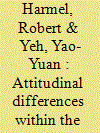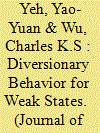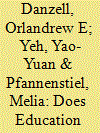| Srl | Item |
| 1 |
ID:
144546


|
|
|
|
|
| Summary/Abstract |
This study addresses whether individuals who were sent down during the Cultural Revolution reveal different political attitudes from those who were socialized during the same period but were not themselves sent down. Using data from the urban sample of the 2006 General Social Survey of China, the authors find evidence that formerly sent-down youth – and particularly sent-down women – as compared to their not-sent-down peers, are today more willing to accept the class-struggle foundation of Mao's communist ideology but are, at the same time, more willing to assess the performance and structure of the communist regime critically.
|
|
|
|
|
|
|
|
|
|
|
|
|
|
|
|
| 2 |
ID:
173981


|
|
|
|
|
| Summary/Abstract |
This paper explores the mechanisms and circumstances under which leaders in weak states adopt diversionary behavior to deal with domestic problems. We examine the case of Taiwan to see if its President, Tsai Ingwen, has adopted diversionary behavior from 2016 to the present. We found that, unlike great powers, weak-state leaders often resort to non-force tactics such as blaming foreign opponents, but the emergence of diversionary behavior is conditional on the stability of their relationship with a major power. In the case of Taiwan, Tsai adopted a more confrontational foreign policy toward China only when USA–Taiwan relations had become more stable and more favorable toward Taiwan. Future work could continue to explore the circumstances and tools unique to weak states’ diversionary behavior.
|
|
|
|
|
|
|
|
|
|
|
|
|
|
|
|
| 3 |
ID:
175744


|
|
|
|
|
| Summary/Abstract |
Policymakers often tout expanded access to education as an antidote for terrorism in Africa. Targeted economic development is also considered a necessary complement to education gains because young, well-educated individuals who lack viable opportunities are vulnerable targets of radicalization. Despite common assertions that poor socioeconomic circumstances drive radicalization, empirical research has hitherto neglected critical inquiry of these policies. Varied findings across cross-national studies of education expansion and the effects of burgeoning youth cohorts warrant a focused examination of regions plagued by the proliferation of extremist groups. This study explores the role of education in mitigating a turn to terror among youth in Africa by examining 50 countries from 1970 to 2011. Expansions in primary, secondary, and tertiary education appear to have different influences on domestic terrorism. In the sub-Saharan region, one model shows primary and secondary education reduced terrorism while others indicate non-monotonic effects in societies experiencing a youth bulge. These nuanced findings suggest education should not be relied upon to counter extremism without additional initiatives to facilitate socioeconomic opportunities. The implication of this paper’s findings are important for academics and policymakers eager to create stable polities across the African continent.
|
|
|
|
|
|
|
|
|
|
|
|
|
|
|
|
| 4 |
ID:
191563


|
|
|
|
|
| Summary/Abstract |
When a war directly intrudes citizens’ living space, it becomes a war of necessity for the public to defend themselves. However, current literature on public support for war has focused exclusively on wars of choice, not of necessity. Thus, we wonder if existing indicators of war support have explanatory power in this context. In this article, we examine existing indicators in a war of necessity—a cross-Strait conflict between Taiwan and China—to study how the public in Taiwan reacts. In addition to finding support for most of our hypotheses, the new context also contributes novel findings to the literature.
|
|
|
|
|
|
|
|
|
|
|
|
|
|
|
|